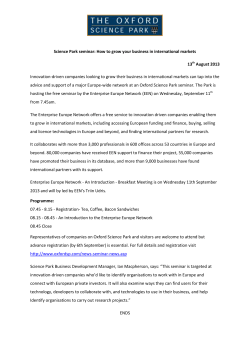
Social capital position generator studies number of Authors (year) topic
Social capital position generator studies Authors (year) LIN & DUMIN (1986) topic sample access to occupations through social ties 339 number of positions 20 (USA) BOXMAN & DE GRAAF & impact of social and human capital on FLAP (1991) the income attainment of managers ANGELUSZ & TARDOS (1991) cultural stratification in Hungary 365 40 (Holland) 2982 / 995* 20 / 23 (Hungary) HSUNG & HWANG (1992) job mobility and social capital 830 20 (Taiwan) ERICKSON (1996) social networks and class structure in the workplace VÖLKER & FLAP (1999) social capital and status attainment under communism BATJARGAL (2000) social capital of Russian’s entrepreneur 393 16 (Kanada) 189 33 (f. GDR) 75 / 56 12 (Russia) ERICKSON (2001) value of social capital to employers and employees LIN & FU & HSUNG (2001) stratification, mobility and social capital 281 8 (Canada) 2835* 15 (Taiwan) ZHAO (2002) social capital and reemployment of laidoff Chinese workers ESPINOZA (2003) ERICKSON (2004) 1367* in Chile (Chile) the distribution of gendered social 1557* MARLOW (2006) macro constraints on individual social 19 (China) social capital and occupational mobility capital WU (2005) 621 5 15 (Canada) 3050* capital (China) weblogs and social capital on-line 29835 13 30 (internet) BEHTOUI (2007) distribution and return of social capital in Sweden INAMASU & IKEDA (2008) gendered social capital and political participation 2439 (Sweden) 1511 18 (Japan) LI & SAVAGE & WARDE social mobility and social capital in 1559* (2008) contemporary Britain (UK) ŠAFR (2008) interpersonal network and social 1197* stratification 15 (Czech Republic) 11 18 XU (2008) roles of entrepreneurial social capital and knowledge structure in the process 70 18 (USA) of new venture innovation VAN DER GAAG & SNIJDERS social survey on the networks of the & FLAP (2008)a Dutch BIAN (2008)a formation of social capital through networks LIN & AO (2008)a MOERBEEK & FLAP (2008)a SMITH (2008)a 1007* 30 (Holland) 4521 20 (China) social capital and occupational 2317* attainment (USA) social resources and occupational 2362* attainment through the life course (Holland) inefficacious job referral networks 103 22 30 15 (USA) MIYATA & IKEDA & internet, social capital, civic engagement KOBAYASHI (2008)a and gender HSUNG & LIN (2008)a social capital of personnel managers 1001 15 (Japan) 126 15 (Taiwan) ENNS & MALINICK & social capital of resource workers in MATTHEWS (2008)a coastal communities TINDALL & CORMIER (2008)a consequences of personal network diversity for political capital MAGEE (2008)a civic participation and social capital 1763 12 (Canada) 178 40 (Canada) 709 12 (USA) LAI (2008)a marriage, gender and social capital 454 18 (Hong Kong) CROSS & LIN (2008)a racial, ethnic and gender differences and access to social capital JOHNSON (2008)a access to social capital and structure of inequality in Ulaanbaatar HSUNG & BREIGER (2009)b social capital of high-tech company workers IKEDA & KOBAYASHI (2009)b heterogeneous personal networks and political participation LIN & AO & SONG (2009)b production and return of social capital in urban China CHEN (2009)b distribution and return of social capital in Taiwan TARDOS (2009)b social capital in communities 557 14 (USA) 312 17 (Mongolia) 369 6 (Taiwan) 1461 23 (Japonia) 3529 21 (Taiwan) 2292 (Taiwan) 736 22 (Hungary) BRUNIE (2009) relational, collective, and generalized social capital LANG & RÖßL (2009) the role of social capital in the development of cooperation MOORE ET AL. (2009) social capital’s negative association with psychological well-being. JOHNSON (2010) relationship between public libraries and social capital BARTELSKI (2010) social capital and human capital 179 15 (USA) 196 10 (Austria) 328 16 (Canada) 132 12 (Canada) 109 25 (Poland) a – included in: LIN & ERICKSON (2008) a – included in: HSUNG & LIN & BREIGER (2009) * – representative sample ANGELUSZ Róbert, TARDOS Róbert (1991), The strength and weakness of weak ties, [w:] Values, networks, and cultural reproduction in Hungary, Péter SOMLAI (red.), The Coordinating Council of Programs, Budapeszt, s. 7-23 BARTELSKI Andrzej S. (2010), Social capital, human capital and social inequalities / Współzależności pomiędzy nierównościami społecznymi, kapitałem ludzkim i kapitałem społecznym, unpublished Ph.D. thesis, Szkoła Nauk Społecznych BATJARGAL Bat (2000), Social Capital and Entrepreneurial Performance in Russia: A Panel Study, Working Papers Series 352, William Davidson Institute, University of Michigan BEHTOUI Alireza (2007), The distribution and return of social capital: evidence from Sweden, European Societies 9(3), s. 383-407 BIAN Yanjie (2008), The Formation of Social Capital among Chinese Urbanites: Theoretical Explanation and Empirical Evidence, [w:] Social Capital: An International Research Program, Nan LIN, Bonnie H. ERICKSON (red.), Oxford University Press, Oxford, s. 81-104 BOXMAN Ed A. W., DE GRAAF Paul M., FLAP Hendrik D. (2008), The impact of social and human capital on the income attainment of Dutch managers, Social Networks 13(1), s. 51-73 BRUNIE Aurélie (2009), Meaningful distinctions within a concept: Relational, collective, and generalized social capital, Social Science Research 38(2), s. 251-65 CHEN Chih-Jou Jay (2009), The Distribution and Return of Social Capital in Taiwan, [w:] Contexts of social capital: social networks in markets, communities, and families, Ray-May HSUNG, Nan LIN, Ronald L. BREIGER (red.), Routledge, Londyn, s. 193-215 CROSS Jennifer L. Moren, LIN Nan (2008), Access to Social Capital and Status Attainment in the United States: Racial/Ethnic and Gender Differences, [w:] Social Capital: An International Research Program, Nan LIN, Bonnie H. ERICKSON (red.), Oxford University Press, Oxford, s. 364-79 ENNS Sandra, MALINICK Todd, MATTHEWS Ralph (2008), It’s Not Only Who You Know, It’s Also Where They Are: Using the Position Generator to Investigate the Structure of Access to Embedded Resources, [w:] Social Capital: An International Research Program, Nan LIN, Bonnie H. ERICKSON (red.), Oxford University Press, Oxford, s. 255-81 ERICKSON Bonnie H. (1996), Culture, class, and connections, American Journal of Sociology 102 (1), s. 217-51 ERICKSON Bonnie H. (2001), Good Networks and Good Jobs: The Value of Social Capital to Employers and Employees, [w:] Social capital: theory and research, Nan LIN, Karen S. COOK, Ronald S. BURT (red.), Aldine De Gruyter, Nowy Jork, s. 127-59 ERICKSON Bonnie H. (2004), The distribution of gendered social capital in Canada, [w:] Creation and returns of Social Capital, Beate VÖLKER, Hendrik D. FLAP (red.), Routledge, Londyn, s. 27-50 ESPINOZA Vincente (2003), Social Capital and Occupational Mobility in the Southern Cone, mimeo HSUNG Ray-May, BREIGER Ronald L. (2009), Position Generators, Affiliations, and the Institutional Logics of Social Capital: A Study of Taiwan Firms and Individuals, [w:] Contexts of social capital: social networks in markets, communities, and families, Ray-May HSUNG, Nan LIN, Ronald L. BREIGER (red.), Routledge, Londyn, s. 3-27 HSUNG Ray-May, HWANG Yih-Jih (1992), Job mobility in Taiwan: job search methods and contacts status, mimeo HSUNG Ray-May, LIN Yi-Jr (2008), Social Capital of Personnel Managers: Causes and Return of Position-Generated Networks and Participation in Voluntary Associations, [w:] Social Capital: An International Research Program, Nan LIN, Bonnie H. ERICKSON (red.), Oxford University Press, Oxford, s. 234-54 IKEDA Ken'ichi, KOBAYASHI Tetsuro (2009), Making Democracy Work via the Functioning of Heterogeneous Personal Networks: An Empirical Analysis based on a Japanese Election Study, [w:] Contexts of social capital: social networks in markets, communities, and families, Ray-May HSUNG, Nan LIN, Ronald L. BREIGER (red.), Routledge, Londyn, s. 72-91 INAMASU Kazunori, IKEDA Ken’ichi (2008), The effect of gendered social capital on political participation: Using the Position Generator method on the JES3 Dataset, mimeo JOHNSON Catherine A. (2008), Access to Social Capital and the Structure of Inequality in Ulaanbaatar, Mongolia, [w:] Social Capital: An International Research Program, Nan LIN, Bonnie H. ERICKSON (red.), Oxford University Press, Oxford, s. 380-93 JOHNSON Catherine A. (2010), Do public libraries contribute to social capital? A preliminary investigation into the relationship, Library & Information Science Research 32(2), s. 147-55 LAI Gina (2008), Marriage, Gender, and Social Capital, [w:] Social Capital: An International Research Program, Nan LIN, Bonnie H. ERICKSON (red.), Oxford University Press, Oxford, s. 342-63 LANG Richard, RÖßL Dietmar (2009), The Role of Social Capital in the Development of Communitybased Cooperatives, mimeo LI Yaojun, SAVAGE Mike, WARDE Alan (2008), Social mobility and social capital in contemporary Britain, The British Journal of Sociology 59(3), s. 391-411 LIN Nan, AO Dan (2008), The Invisible Hand of Social Capital: An Exploratory Study, [w:] Social Capital: An International Research Program, Nan LIN, Bonnie H. ERICKSON (red.), Oxford University Press, Oxford, s. 107-132 LIN Nan, AO Dan, SONG Lijun (2009), Production and Returns of Social Capital: Evidence From Urban China, [w:] Contexts of social capital: social networks in markets, communities, and families, Ray-May HSUNG, Nan LIN, Ronald L. BREIGER (red.), Routledge, Londyn, s. 163-92 LIN Nan, DUMIN Mary (1986), Access to Occupations through Social Ties, Social Networks 8(4), s. 36585 LIN Nan, FU Yang-chih, HSUNG Ray-May (2001), The Position Generator: Measurement Techniques for Investigations of Social Capital, [w:] Social capital: theory and research, Nan LIN, Karen S. COOK, Ronald S. BURT (red.), Aldine De Gruyter, Nowy Jork, s. 57-85 MAGEE Marc Porter (2008), Civic Participation and Social Capital: A Social Network Analysis in Two American Counties, [w:] Social Capital: An International Research Program, Nan LIN, Bonnie H. ERICKSON (red.), Oxford University Press, Oxford, s. 308-27 MARLOW Cameron A. (2006), Linking without thinking: Weblogs, readership, and online social capital formation, mimeo MIYATA Kakuko, IKEDA Ken’ichi, KOBAYASHI Tetsuro (2008), The Internet, Social Capital, Civic Engagement, and Gender in Japan, [w:] Social Capital: An International Research Program, Nan LIN, Bonnie H. ERICKSON (red.), Oxford University Press, Oxford, s. 206-33 MOERBEEK Hester, FLAP Hendrik D. (2008), Social resources and Their Effect on Occupational Attainment through the Life Course, [w:] Social Capital: An International Research Program, Nan LIN, Bonnie H. ERICKSON (red.), Oxford University Press, Oxford, s. 133-56 MOORE Spencer, DANIEL Mark, GAUVIN Lise, DUBÉ Laurette (2009), Not all social capital is good capital, Health & Place 15(4), s. 1071-7 ŠAFR Jiří (2008), How inter-connected are citizens in society, and why does it matter?, Sociologický webzin 7-8, s. 17-22 SMITH Sandra Susan (2008), A Question of Access or Mobilization? Understanding Inefficacious Job Referral Networks among the Black Poor, [w:] Social Capital: An International Research Program, Nan LIN, Bonnie H. ERICKSON (red.), Oxford University Press, Oxford, s. 157-181 TARDOS Róbert (2009), Social Capital in Communities, Development and Integration: The Four-Village Case Study in Hungary, [w:] Contexts of social capital: social networks in markets, communities, and families, Ray-May HSUNG, Nan LIN, Ronald L. BREIGER (red.), Routledge, Londyn, s. 216-243 TINDALL David B., CORMIER Jeffrey J.(2008), Gender, Network Capital, Social Capital, and Political Capital: The Consequences of Personal Network Diversity for Environmentalists in British Columbia, [w:] Social Capital: An International Research Program, Nan LIN, Bonnie H. ERICKSON (red.), Oxford University Press, Oxford, s. 282-307 VAN DER GAAG Martin Pieter Johannes, SNIJDERS Tom A. B., FLAP Hendrik D. (2008), Position Generator measures and their relationship to other social capital measures, [w:] Social Capital: An International Research Program, Nan LIN, Bonnie H. ERICKSON (red.), Oxford University Press, Oxford, s. 27-49 VÖLKER Beate, FLAP Hendrik D. (1999) Getting ahead in the GDR: social capital and status attainment under communism, Acta Sociologica 41(1), s. 17-34 WU Shanhui (2005), Macro Constraints on Individual Social Capital: Socioeconomic Development, Geographic Mobility, and Accessible Network Resources, mimeo XU Yang (2008), How important are entrepreneurial social capital and knowledge structure in new venture innovation?, [w:] Frontiers of Entrepreneurship Research 2008, Babson College, s. 265-79 ZHAO Yandong (2002), Measuring the Social Capital of Laid-off Chinese Workers, Current Sociology 50(4), s. 555-71 Compiled by Andrzej S. Bartelski (18 IV 2010)
© Copyright 2025













